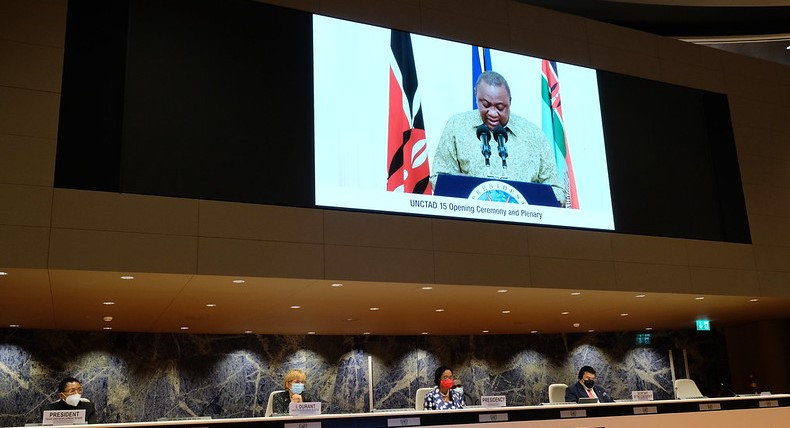Strong declaration on COVID-19 vaccines, trade, debt and climate adopted at historic UNCTAD15 conference
 Brussels, 18 October 2021/OACPS: *UNCTAD’s15th quadrennial conference (UNCTAD15)held from 3 to 7 October adopted an agreement to promote inclusive and resilient economic recovery in developing countries as they grapple with unequal access to COVID-19 vaccines, a debt crisis, the climate emergency and other unprecedented challenges.
Brussels, 18 October 2021/OACPS: *UNCTAD’s15th quadrennial conference (UNCTAD15)held from 3 to 7 October adopted an agreement to promote inclusive and resilient economic recovery in developing countries as they grapple with unequal access to COVID-19 vaccines, a debt crisis, the climate emergency and other unprecedented challenges.
The first time that the UN’s key global conference on trade and development took place in a small island developing state, in a virtual format with events in Barbados, Geneva and 16 developing states, the conference was opened in Barbados on 4 October by UN Secretary-General António Guterres, alongside Barbados Prime Minister Mia Amor Mottley, Kenyan President Uhuru Kenyatta and UNCTAD Secretary-General Rebeca Grynspan.
During the conference, themed, ‘From inequality and vulnerability to prosperity for all’, Prime Minister Mottley and other Caribbean Community (CARICOM) representatives focussed on the issues which confront the region as Small Island Developing States (SIDS).
During the Conference, member states adopted several documents, including:
• The political declaration – the Spirit of Speightstown
• The Bridgetown Covenant – which sets out the quadrennial work programme for UNCTAD aiming to revitalize and strengthen the organization.
• The Ministerial Declaration of the group of Small Island Developing States (SIDS) outlining their priorities.
• The Barbados Accord from the Creative Economy and Digitalization Forum.
Spirit of Speightstown
Prepared under the responsibility of the Government of Barbados, UNCTAD15’s political declaration, known asthe Spirit of Speightstown, noted that “full global recovery will not be possible without enhanced international cooperation and until the pandemic subsides in each and every country.”
The declaration says the global crisis offers countries an opportunity to redouble their efforts to move from existing inequality and vulnerability to prosperity for all; and warns that business as usual will not enable the world economy to bounce back, avert further environmental degradation or ensure all people can live in dignity, let alone keep development on track.
UNCTAD Member States urged for several priorities to be addressed as a matter of urgency: revitalised multilateralism; inequality within and between countries; vulnerabilities of developing countries including SIDS; financing sustainable development; decision-making and participation in international institutions; tax cooperation, and the digital divide.
The Bridgetown Covenant
Adopted by UNCTAD’s 195 Member States, theBridgetown Covenant, outlines a roadmap for transforming economies through economic diversification; addressing unsustainable debt burdens in developing countries; making economies more sustainable and resilient; improving the financing of development; and reimaging how multilateralism will function in the future.
It highlights the unprecedented circumstances in which UNCTAD15 took place, recognizing both the terrible death toll of COVID-19 worldwide, the millions of people who have been pushed into extreme poverty by the pandemic and the underlying inequalities within and between many developing countries.
The Bridgetown Covenant underscored the need to reinvigorate and revitalize UNCTAD’s intergovernmental mechanism, acknowledging the role of the UN as the appropriate forum for multilateral dialogue on sustainable development due to its universal membership, and the commitment to have sustainable development at the centre of all processes – at the multilateral, regional and bilateral levels. The document also outlined the political dimensions of issues such as tax cooperation linked to fighting illicit financial flows and ensuring that international measures on tax transparency, anti-money laundering and combating the financing of terrorism are applied in a non-discriminatory, fair and balanced manner, with member states envisaging a role for UNCTAD in tackling these.
Prime Minister Mottley of Barbados, president of UNCTAD for the next three years, indicated that UNCTAD will continue its work in collaboration with other national, regional and global bodies. She also made clear her desire to secure tangible results from UNCTAD XV which will benefit the people of Barbados and the other CARICOM member states, as well as the global community in the common interest of humanity.
Specifically, the Barbadian prime minister wants to see UNCTAD involved in further research on e-commerce and digital trade; on ‘reconstructing and deconstructing’ inequalities; removing the rigidities in the debt to GDP ratio, making available needed fiscal space; greater equity in accessing public goods, such as vaccines; and promoting food and nutrition security.
Prime Minister Mottley urged the international community to consider the reality of the developing world and of small island developing states, especially their exposure to the climate crisis – which does not result from their own doing, and the need for greater funding for adaptation to the worsening impacts of climate change and management of debt.
President Kenyatta of Kenya, also President-in-Office of the OACPS Summit of Heads of State and Government, urged the global community to come together to work towards a functional multilateral system. “No single government or multilateral agency can address global threats alone,” he said. “We must work together in solidarity if we are to succeed.”
* UNCTAD – United Nations Conference on Trade and Development
Contributors:
Elizabeth Morgan, Jamaican Gleaner; UNCTAD Press Unit
Photo: UNCTAD
